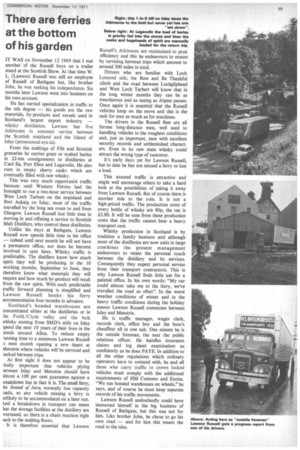There are ferries at the bottom of his garden
Page 97

If you've noticed an error in this article please click here to report it so we can fix it.
IT WAS on November 12 1969 that I met another of the Russell boys on a trailer stand at the Scottish Show. At that time W.
L. (Lawson) Russell was still an employee of Russell of Bathgate but, like brother John, he was seeking his independence. Six months later Lawson went into business on his own account.
He has carried specialization in traffic to the nth degree — his goods are the raw materials, by-products and vessels used in Scotland's largest export industry — whisky distillation. Lawson has five Atkinsons in constant service between the Scottish mainland and the Island of Islay (pronounced eye-la).
From the maltings of Fife and Scottish granaries he carries grain or malted barley in 22-ton consignments to distilleries at Caol Ila, Port Ellen and Lagavulin. He also runs in empty sherry casks which are eventually filled with raw whisky.
This was very much opportunist traffic because until Western Ferries had the foresight to run a two-hour service between West Loch Tarbert on the mainland and Port Askaig on Islay, most of the traffic travelled by the long sea route to and from Glasgow. Lawson Russell lost little time in moving in and offering a service to Scottish Malt Distillers, who control these distilleries.
Unlike his days at Bathgate, Lawson Russell now spends little time in his office — indeed until next month he will not have a permanent office, nor does he become involved in spot hires. Whisky traffic is predictable. The distillers know how much spirit they will be producing in the 10 working months, September to June, they therefore know what materials they will require and how much by-product will result from the raw spirit. With such predictable traffic forward planning is simplified and Lawson Russell books his ferry accommodation four months in advance.
Scotland's bonded warehouses are concentrated either at the distilleries or in
the Forth /Clyde valley and the bulk
whisky coming from SMD's stills on Islay spend the next 10 years of their lives in the
)onds around Alloa. To reduce empty -unning time to a minimum Lawson Russell s next month opening a new depot at Vlenstrie where vehicles will be serviced and )arked between trips.
At first sight it does not appear to be fitally important that vehicles plying )etween Islay and Menstrie should have dmost a 100 per cent guarantee against a treakdown but in fact it is. The small ferry,
he Sound of Jura, normally has capacity
oads, so any vehicle missing a ferry is mlikely to be accommodated on a later run.
knd a breakdown in transport can mean hat the storage facilities at the distillery are wertaxed, so there is a chain reaction right )ack to the malting floors.
It is therefore essential that Lawson
Russell's Atkinsons are maintained to peak efficiency and this he endeavours to ensure by servicing between trips which amount to around 300 miles in total.
Drivers who are familiar with Loch Lomond side, the Rest and Be Thankful climb and the road between Lochgilphead and West Loch Tarbert will know that in the long winter months they can be as treacherous and as taxing as Alpine passes.
Once again it is essential that the Russell vehicles keep on the move and this is the task for men as much as for machines.
The drivers in the Russell fleet are all former long-distance men, well used to handling vehicles in the roughest conditions and, just as important, men with excellent security records and unblemished characters. Even in its raw state whisky could attract the wrong type of customer.
It's early days yet for Lawson Russell, but to date he has not missed a ferry or lost a load.
This assured traffic is attractive and might well encourage others to take a hard look at the possibilities of taking it away from Lawson Russell. But of course there is another side to the coin. It is not a high-priced traffic. The production costs of every bottle of whisky are 80p, the tax is £2.80. It will be seen from these production costs that the traffic cannot bear a heavy transport cost.
Whisky production in Scotland is by tradition a family business and although most of the distilleries are now units in large combines the present management endeavours to retain the personal touch between the distillery and its services.
Consequently they expect personal service from their transport contractors. This is why Lawson Russell finds little use for a palatial office. In his own words: "My car could almost take me to the ferry, we've travelled the road so often". In the worst weather conditions of winter and in the heavy traffic conditions during the holiday season Lawson Russell commutes between Islay and Menstrie.
He is traffic manager. wages clerk, records clerk, office boy and the boss's chauffeur all in one suit. One minute he is the outside foreman, the next the public relations officer. He handles insurance claims and log sheet examination as confidently as he does PAYE. In addition to all the other regulations which ordinary operators have to contend with, he and all
those who carry traffic in crown locked vehicles must comply with the additional
requirements of HM Customs and Excise. "We run bonded warehouses on wheels," he says, and of' course he must keep separate records of his traffic movements.
Lawson Russell undoubtedly could have immersed himself in the big business of Russell of Bathgate, but this was not for him. Like brother John. he chose to go his own road — and for him this meant the road to the isles.










































































































































































































